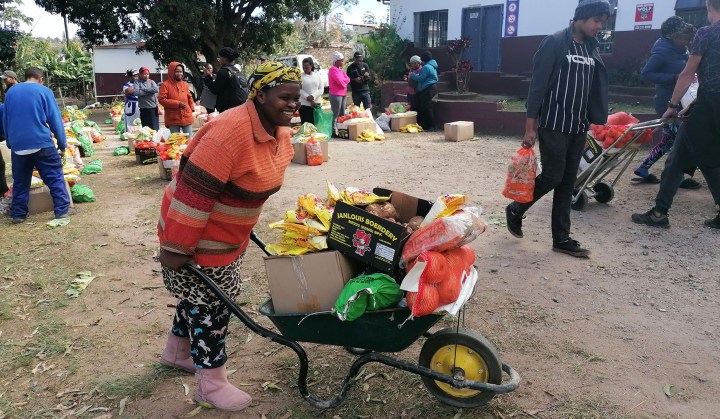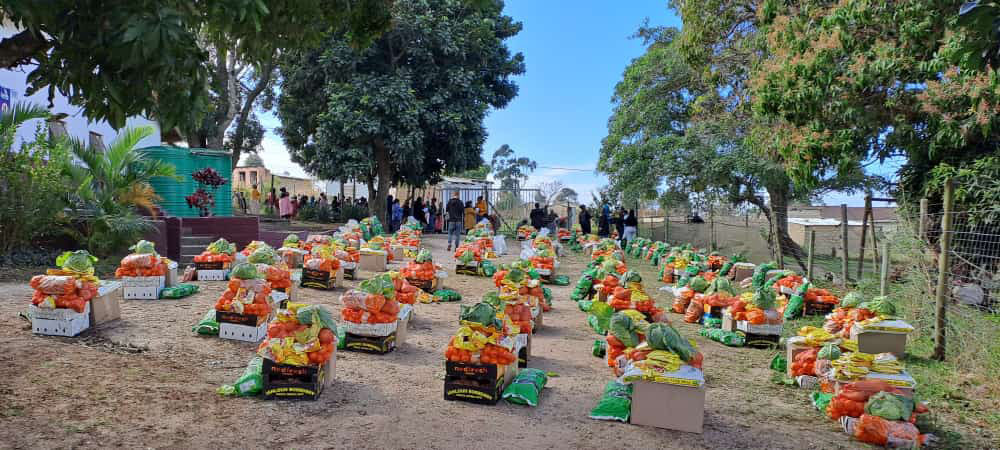
FOOD JUSTICE
SA Harvest – an organisation with a vision to change the food system and end hunger

For most people, ‘food rescue’ is not an everyday term – but it should be. With 12 million tons of food going to waste every year in South Africa, more than enough to feed this country’s hungry millions, the non-profit SA Harvest is one organisation that is starting to make serious inroads into repurposing food waste, having ‘rescued’ more than eight millions tons so far to provide 30 million (and counting) nutritious meals to NGOs that feed people in need. Maverick Citizen spoke to SA Harvest’s founder and CEO, Alan Browde, for World Food Day.
Alan Browde is a man on a mission – to end hunger in South Africa. And he believes it can be done. “This hunger situation in South Africa is a catastrophe – and I use that word advisedly,” Browde says – “which needs our 24-hour-a-day, 365-days-a-year attention.”
World Food Day, 16 October, marks the third birthday of SA Harvest, the food-rescue organisation Browde founded, which so far has delivered 30 million meals to communities throughout South Africa from its hubs in Cape Town, Johannesburg and Durban.
Those meals are made by SA Harvest’s more than 200 vetted charity beneficiaries (mostly community-based organisations) throughout the country, created from almost 8.5 million tons of surplus, high-quality food that would otherwise have gone to waste.
How SA Harvest works
SA Harvest “rescues food from the food chain”, Browde explains, which means collecting it from any farmers, manufacturers, retailers and anyone else in the food ecosystem who has excess nutritious food (perishable and non-perishable) to donate. Then, using refrigerated vehicles and a hi-tech monitoring system that allows for complete traceability of the food from its point of origin to its final recipient, SA Harvest distributes nutritionally balanced van- or truckloads of the donated produce to the beneficiaries who create the meals. (SA Harvest’s first truck was sponsored by Gidon Novick, founder of Kulula, Lucid Ventures and LIFT, and now SA Harvest’s chairperson.)

Two of the many collection points for beneficiaries to safely collect their food parcels.
(Photo: SA Harvest)
Healthy mix
The deliveries, says Vanessa Naude, SA Harvest’s PR and social media manager, usually consist of “a mix of either maize or rice and vegetables, which is usually cabbage, spinach or kale, carrots and/or onions, and fruit, which is season-dependent, but mostly oranges, naartjies, apples, pears or plums.”
The mix differs from week to week, region to region and depends on the season, Naude says, “but we aim for a mix of carbs, veg, fruit and protein, where possible – based on what we’re able to rescue – most often chicken or meaty bones.”
The beneficiaries are independent charitable organisations such as the Homestead Project for street children in Cape Town, Healing Wings in Nelspruit, Amanzimtoti Child Welfare, and Soweto Home-based Givers. (The full list of 200+ beneficiaries is on SA Harvest’s website.)
Read in Daily Maverick: “A strong food justice coalition is needed to fight effectively for the health of all South Africans”
The food donations by producers are facilitated by initiatives such as OneFarm Share, a digital trading platform created by Standard Bank that matches food producers who have excess fresh produce to food requests from registered charities.

The gratitude of a beneficiary. (Photo: SA Harvest)
An exception to this model of delivering food to independent beneficiaries that are in the (non-profit) business of charitably feeding people was SA Harvest’s direct delivery of food parcels – each sufficient for a family of six for two months – to nearly 5,000 families in the flood-ravaged areas of Port Shepstone, Richards Bay and eThekwini in July 2022, in partnership with the Solidarity Fund.
Browde (71) grew up in Johannesburg and started his career as a dairy farmer on a kibbutz in Israel, then went on to obtain a master’s degree in urban, community and regional economics from the University of Cape Town, before running a marketing business of his own for 24 years. Yet he is not a huge fan of single days consecrated to “causes” such as food or mothers, designed to raise people’s consciousness for one day a year, “and then the rest of the year we go back to sleep”, he says.
He acknowledges that the Covid-19 pandemic and lockdown in South Africa woke people up to the fact of widespread hunger, but “the catastrophe of hunger in South Africa the day before Covid was the same as the day after”, he told Maverick Citizen.
Structural interventions to end hunger
Before Covid, between 13 and 14 million people in South Africa went to bed hungry every night, Browde said. Now, about 20 million do, while 12 million tons of food is wasted every year – enough to feed those 20 million three nutritious meals a day for more than a year.
While recognising that “charity is important”, Browde appreciates the unfortunate connotations of the “charity” concept, acknowledging what is sometimes “a great indignity” in charity. “We don’t want to have so many millions of people living with their hands out,” he says.

SA Harvest’s founder and CEO, Alan Browde. (Photo: SA Harvest)
Browde is also acutely aware that charity doesn’t solve the structural problems that make it necessary in the first place. “Charity does not end hunger,” he says, and for this reason SA Harvest has an equally strong focus on “systemic intervention” – acting at a food-systems level, to change the way food supply works in South Africa.
“The systemic side of our business in essence is to create a structure which feeds people, but while doing so, create food sovereignty – food independence – for those who are in need.”
The systemic bit takes many forms and has to be “completely concomitant with the ‘charity’ side”. He describes SA Harvest’s Lusikisiki branch, set to open in January 2023 and its fourth, as an example of how the “systemic” and “charity” aspects naturally accompany each other.
Read in Daily Maverick: “South Africa has enough food yet its people go hungry – Langa Learning Journey tackles our tragic paradox”
“The principle there is that first we will be feeding people on a charitable basis. But the branch is going to be run, at the beginning, by eight postgraduate students who are unable to get work, which is so common in South Africa. They will be running the SA Harvest business. They will be taught the logistics, the markets, how to make contacts, how to source the food, how to distribute the food, where to distribute it.”
At the same time, the eight post-grad managers will undertake year-long agri-business diplomas.
“At the end of the year these young people are going to be able to run an agri-business in whatever form – all in the food space,” Browde says. “We’ll be helping them get this diploma but at same time they will be working on a salaried basis, a non-charitable way of earning a living.” And, perhaps most critically, growing the base of people – especially young people trapped by South Africa’s overwhelmingly high (65%) rates of youth unemployment – and of communities that are developing local food systems.
In addition, SA Harvest has done deals with retailers and with other partners to guarantee that they will buy whatever the freshly qualified agri-entrepreneurs’ new businesses produce.
Visit Daily Maverick’s home page for more news, analysis and investigations
“It’s a small example of how we are moving ahead and how everybody has to,” Browde says.
“We cannot continue just to be charitable organisations operating on their own. There are all sorts of other organisations that do amazing work, but if there isn’t this move towards sustainable solutions for individuals in terms of getting fed, then we’re doing something wrong.”
Collaboration
Which raises the question of what collaboration looks like in South Africa, and what still needs to be done to scale up and improve the reach of SA Harvest and other organisations doing this type of work.
“We can’t do this without collaboration,” Browde says. “Our business is collaboration – with other NGOs, everybody we get the food to.” But at the moment, he says, the levels of upstream collaboration – with other initiatives also working on their own – are not sufficient “in terms of running a more efficient and effective campaign in this world of food rescue”.
Though 8.5 million tons of food (the amount SA Harvest has rescued in its three years) is a lot, not enough is being done in the food rescue space, Browde believes. The overall amount of food rescued in South Africa is “abysmally low… there is such a huge potential for improving the rescue of food waste.”
One of the things Browde and team envision for more fruitful collaboration with partners is to start sharing data with those other organisations doing similar work (such as FoodForward SA, created in 2009) so that they can pool information in order to streamline their logistics and reduce inefficiencies or duplication – “to create what we’ve been calling the ‘food-space tech’”.
And what about collaboration with the state, which, in the first instance, is constitutionally mandated to ensure everyone in South Africa has enough to eat, and in the second, should be making the existence of food charities redundant?

SA Harvest’s jam-packed KZN warehouse before the food parcels are distributed. (Photo: SA Harvest)
“Hunger in SA is an injustice,” Browde declares. “Section 27 of the Bill of Rights says everybody is entitled to sufficient food – and this is not being delivered on.” Organisations like his “have to do what we do because if we don’t do it and the NGO space doesn’t get involved, people will be dying in their thousands. That doesn’t happen mainly because organisations like ours are involved, because the government and quasi-government structures either can’t or don’t do it.”
To change this, and in support of the government, which at local and provincial levels especially may not have the capacity to deliver on the rhetorical “right” to food, SA Harvest has a plan.
“We are driving to understand how the country could best deliver on Section 27,” Browde says, “and ensure that that right is delivered. We are working on research, we’re working with lawyers and people who understand the situation in order to be able to sit down with government structures and say, ‘let’s do it together’.” DM/MC



















Comments - Please login in order to comment.